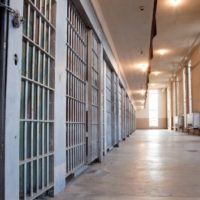
MivPiv/iStockBy CHRISTINA CARREGA, ABC News
(NEW YORK) — Earlier this month, an inmate at Great Meadow Correctional Facility began to notice some of the other prisoners were getting sick. Fearful for his life, he called his wife, Renee Evans-Henry.
Evans-Henry said her husband was afraid that the coronavirus had made its way into the Washington County, New York, facility weeks after officials suspended facility visitation as a preventative measure — despite the fact that inmates weren’t told anything. She asked ABC News not use her husband’s name for fear of law enforcement retaliation against him.
According to coronavirus data for 45 state prisons released Sunday by the state’s Department of Corrections (DOC), 211 state prisoners and 794 jail staffers have contracted the coronavirus, formally known as COVID-19. Of the infected inmates, five have died while 57 have recovered, according to the report.
At Great Meadow, there were seven inmates with confirmed COVID-19 cases as of March 31 and three have recovered, according to the report.
Evans-Henry’s husband is the eighth case.
“A few weeks ago, he called me and kept saying ‘the virus is in here, the virus is in here.’ He said people are dying and they aren’t giving them any reason,” Evans-Henry, of Queens, New York, told ABC News on Tuesday.
Members of the Inmate Liaison Committee are expected to brief all inmates on positive cases — without identifying them per HIPAA privacy rules — and inform them of any new actions that are being taken in response to the global health emergency. For each positive coronavirus case, DOC is expected to follow all Department of Health protocols, including performing a reverse trace to identify and notify any potentially impacted individuals and isolating or quarantining them if necessary.
The five inmates who died from the coronavirus were not among the 1,404 housed in Great Meadow, according to the report. Three were in Sing Sing, one was in Otisville and one was in Queensboro Correctional Facility.
Despite African Americans making up 13% of the U.S. population, 33% of coronavirus patients are African American, according to Centers for Disease Control and Prevention statistics as of Tuesday. The demographic makeup of the infected and deceased state inmates was not available.
Based on figures from the New York State Division of Criminal Justice’s criminal history’s database, of the 13,655 felony arrests in 2018, those sentenced to prison included 6,505 African Americans, 3,813 whites, 3,042 Hispanics, 148 Asians and 147 who were considered “other/unknown.”
Evans-Henry’s husband, who is black, is also one of the 98 inmates who volunteered to make the thousands of gallons of “NYS Cares” hand sanitizer to help combat the low stock of the cleanser at state agencies like schools and the MTA, where she’s employed as a bus operator.
Evans-Henry’s husband, who is in his 40s and is in good health, wasn’t feeling well on Saturday and went to the infirmary, she said.
“The nurse said he had a fever of 108, then 102, then 97 … they gave him the coronavirus test,” said Evans-Henry, who learned of his positive diagnosis on Tuesday morning.
Evans-Henry, 42, said that during each call with her husband — who is serving an 8-years-to-life sentence for assault in St. Lawrence County, New York — he said he was afraid he was going to catch the virus because the facility’s conditions were “horrific” and “not clean,” with inmates given only a “thin cloth to wear” on their face.
“I really feel numb, lost, confused because I’m trying to figure out how he got it and what precautions did they take to protect the inmates from getting the virus? Only the COs and medical staff are going in and out of there,” said Evans-Henry. “I can still hear him saying it’s there, it’s there, and then he got it.”
Visitation ended at correctional facilities statewide on March 14.
DOC officials wouldn’t comment directly on conditions at Great Meadow, but said they have taken several preventative measures including allowing the incarcerated population to use state-issued handkerchiefs as masks and stopping internal transfers of incarcerated individuals except for medical and other exigent circumstances. Officials also said they are following enhanced cleaning and sanitizing measures and disinfecting procedures for office surfaces and devices, consistent with CDC and New York State Department of Health guidelines.
Evans-Henry said she had to make the painful phone calls to her husband’s family to let them know about his diagnosis. Medical officials told her they were placing him in quarantine for 14 days, she said.
“His sister cried,” Evans-Henry said. “I have been praying. I’m hurt. Listening how many deaths are happening worldwide and how this virus is taking people down one by one — how do I help him? How do we fix it? I can’t even talk to him — there’s no phones in the infirmary.”
Evans-Henry said that while others may not have compassion for inmates because of the crimes they were convicted of, “they are human beings and are confined in a small space,” despite social distancing guidelines.
“He just wants to do his time and come home,” she said.
Copyright © 2020, ABC Audio. All rights reserved.















